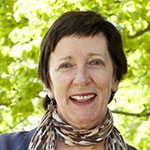
Pauline Gardiner Barber
In April 2019, On the Move (OTM) team members from across Canada descended into Reykjavik for the international conference, “Mobilities and Transnationalism in the 21st century,” at the University of Iceland. The conference was the closing event for the project, “Mobilities and Transnational Iceland,” founded by Rannis, the Icelandic Centre for Research.
This interdisciplinary symposium considered a broad range of mobilities including emigration, immigration, foreign workers, refugees, human trafficking, business trips, educational and cultural transfer, and tourism, and how they are determinated by three interlinked areas: social and cultural aspects of mobility, institutional and legal changes, and cultural politics.
Recently, I had the opportunity to talk with OTM Co-Investigator, Dr. Pauline Gardiner Barber, Professor in the Department of Sociology and Social Anthropology at Dalhousie University and Board Member with Mobilities and Transnational Iceland, about her role in bringing OTM to this international event.
How did you get involved in the Board for Mobilities and Transnational Iceland?
I met Unnur Dis Skaptadottir through the OTM project and it turned out that as a couple of anthropologists, we had a lot in common. We were working from a similar theoretical perspective in anthropology and political economy; we were both working with migrant Filipinos; she had worked in the Philippines, I had worked in the Philippines. We just connected in that way, and I think it was because of that overlapping of arenas of common interest that she decided to include me on the board of their project.
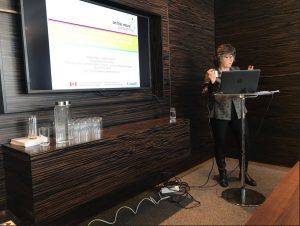
Barb Neis.
Was this the first event with the project you were involved in?
I attended a conference the year before, in March 2018, where the Icelandic researchers involved in the project were workshopping the idea of publications from their respective research projects. I gave an invited lecture at the University of Iceland and then we went on a retreat with researchers just outside the city of Reykjavik where there were a series of discussions around publications that we, the two international Board members, were invited to respond to. I also did a workshop with graduate students, giving them feedback on their projects.
It was quite an interdisciplinary group. We had people from different areas of research, and we saw those same three lines of research work together under the organizing team for “Mobilities and Transnationalism in the 21st Century”, the conference last April.
What was your role with the “Mobilities and Transnationalism in the 21st Century” conference?
They had asked me mid-point between these two conferences, would I like to put together a panel for their conference. I asked Unnur Dis Skaptadottir, why don’t we bring in some members from OTM and I will plug in the holes. She thought that was a great idea, and I contacted Barb to see what she thought of this idea. I particularly wanted Barb to present because she has such a great overview of the mobilities research involved in the project across Canada. The panel I put together had Barb Neis, and another researcher I worked over the years very closely, Belinda Leach. Then we had some other OTM researchers (Catherine Bryan, Adam Perry, Dalia Gesualdi-Fecteau) who are super good and whose work Barb had supported through the project. We were also joined by Solène Gautron from Heidelberg/Yale Universities who spoke about her doctoral project on transient Chinese workers living in various labour camps as part of their employer’s ‘going global’ labour export program.
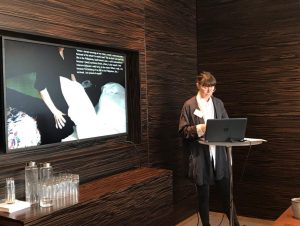
Catherine Bryan.
I think our panel was appreciated because it was fairly tight. We were quite on topic and talking about research that people had a good grasp of as we were in the concluding project stages. I think that links back to OTM and the support of OTM for the various research programs that were represented in the double session.
Were there any sessions that you found particularly interesting?
I thought the three keynotes were really well selected because each of their topics were very appropriate to the body of research represented at the conference, so they were on the button. In case people are interested they were: Mimi Sheller, Sociologist and Director of the Center for Mobilities Research and Policy, Drexel University and well-known for her multiple work on mobilities; Liz Fekete, Director of UK Institute of Race Relations and head of its European Research Programme; and, Sharon MacDonald, Social Anthropologist from the Institute of European Ethnology, Humboldt-Universität zu Berlin, also director for Centre for Anthropological Research on Museums and Heritage.
We had sociology, anthropology, geography, education, cultural representation, museum studies, and legal studies. It was nicely controlled, unlike some of the bigger conferences one goes to. I really appreciated the keynotes for the way they spoke to contemporary issues around mobilities and transnationalism; they were relatively broad and contemporary in their scope. Usually you don’t like all the keynotes, but this was a very good series of talks.
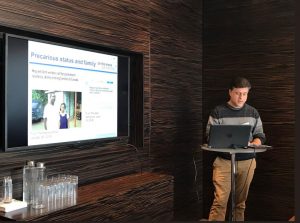
Adam Perry.
I think the students really appreciated the methodologies session that Sharon Roseman was involved with too. It’s an incredibly valuable experience for PhD students because PhD students have different relationships with their supervisors, not just because supervisors are different, some are more hands on than others, but also because there are different conventions at different universities. At some universities students may not see their supervisor as much, and there are different mobilities programs where students are working across two national contexts, two different universities, so to meet others who are doing the same kind of analytic work that you are trying to do with your data, and to be supported by professors who are very experienced is a wonderful experience for PhD students.
It’s a hard time so students can be insecure about their data. It takes a lot of courage to begin to talk about your work and your ideas, and they can help each other. It’s good for students to hear and share experiences about their own fieldwork and their strategies, but it’s also good to get feedback from professors who aren’t your supervisor.
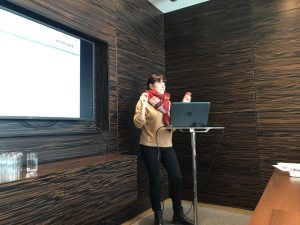
Dalia Gesualdi-Fecteau.
It was a relatively small and compact conference. When I say it was international, because of funding, a lot of the people who came from outside of Iceland were from Nordic countries. There were a couple of other Canadians, but it was all very focused, which I think is the best kind of conference. And I think the whole Canadian crew that was on my panel really enjoyed it. The fact that it was in a hotel where most of us were staying also helped, because we ate together, we saw a lot of each other, and it was one of those lively gatherings where people could mingle easily. I should also credit the amazing work of conference co-ordinator Anna Wojtynska, also an OTM researcher. Anna helped get everyone to the conference doing lots of trouble shooting before, during and after the event. Big congratulations to Anna are also due – she successfully defended her doctoral thesis this August so it’s Dr. Wojtynska from here on in.
To learn more about the conference, “Mobilities and Transnationalism in the 21st century,” check out their website at https://conference.hi.is/mobilities/
Photos by Adam Perry
Conference sessions with OTM members were listed in the program as follows:





Leave a Reply